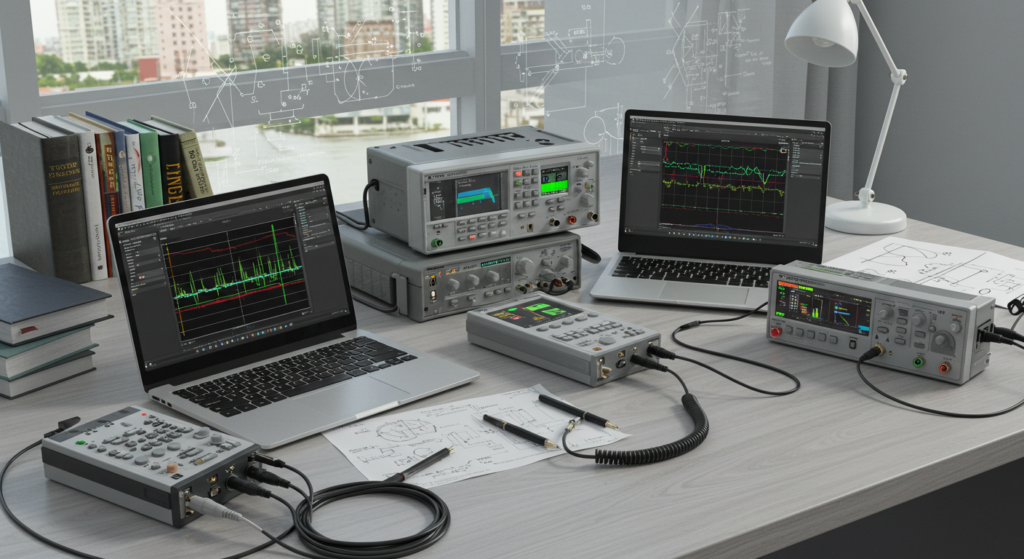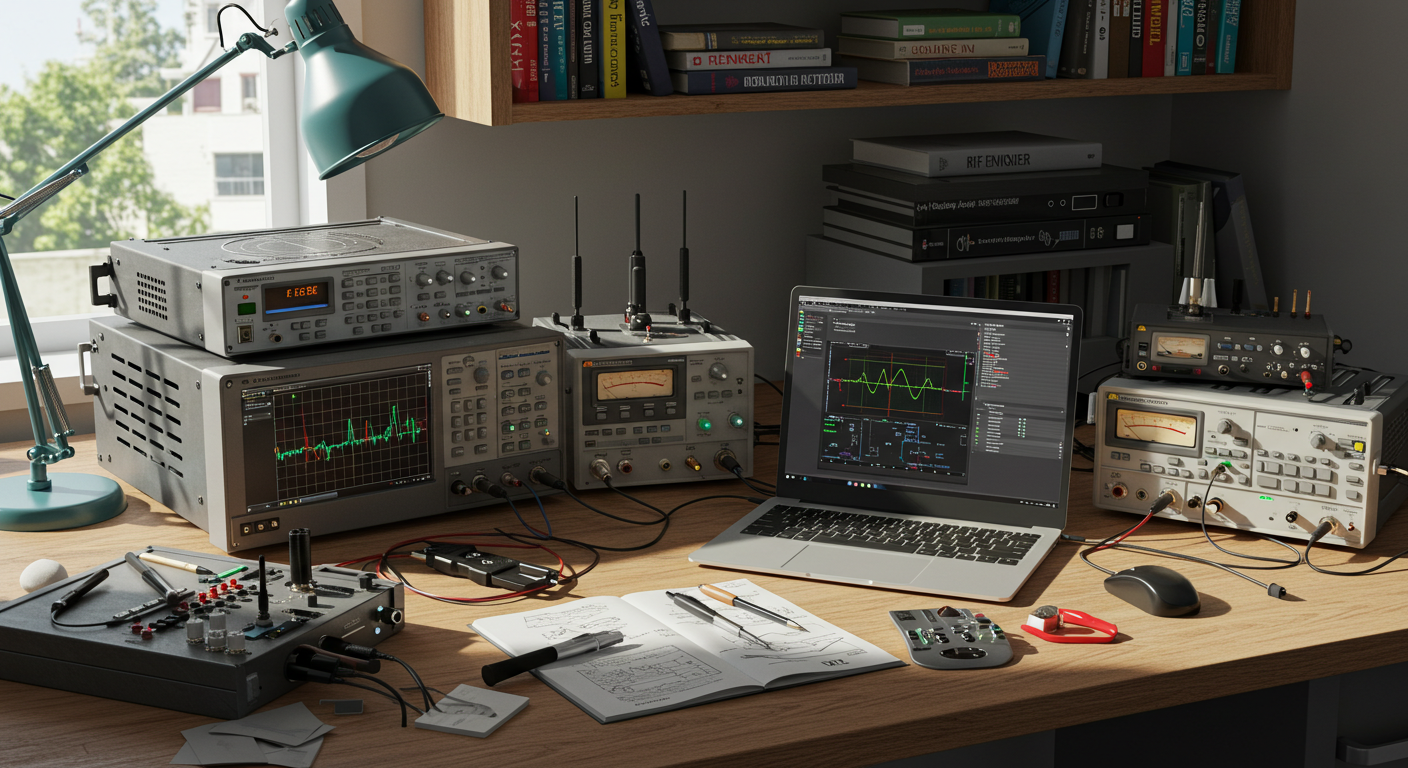Spectrum analyzers play a crucial role in the toolkit of electronics engineers, particularly in the realm of RF engineering. These tools allow professionals to analyze RF signals, providing insights into frequency components, amplitudes, and noise levels present in RF circuits. They are essential for designing and testing RF front-end systems and RF power amplifiers, ensuring optimal performance and compliance with specifications. Alongside spectrum analyzers, network analyzers are indispensable for characterizing the behavior of RF circuits and systems. These top RF engineering tools and resources are vital for anyone looking to succeed in the field, enabling engineers to tackle the complexities of RF design and implementation effectively.
| Tool | Functionality | Key Features |
|---|---|---|
| Spectrum Analyzer | Analyzes RF signals | Frequency range, amplitude measurement, noise level analysis |
| Network Analyzer | Characterizes RF circuit behavior | Return loss measurement, insertion loss analysis, S-parameters |
| Signal Generator | Generates RF signals for testing | Wide frequency range, modulation capabilities, high output power |
| Power Meter | Measures RF power output | True RMS measurements, dual-range capabilities, USB connectivity |
| EMI Test Receiver | Measures electromagnetic interference | Compliance testing, frequency scanning, built-in analysis tools |
Contents
- 0.1
- 0.2 Top RF Engineering Tools and Resources Everything You Need to Succeed | Spectrum Analyzers
- 0.3 Network Analyzers
- 1 Resources for RF Engineering Professionals
- 2 Software Solutions for RF Design
- 3 Books and Publications for RF Engineers
- 4 Online Communities and Forums
- 5 Conclusion
- 6 FAQS
- 6.1 What are the essential RF front end and RF spectrum tools every engineer should have in their toolbox?
- 6.2 What are some key considerations for selecting tools for an rf/ microwave system design project?
- 6.3 What are the top RF engineering tools and resources available to help engineers succeed in their projects?
- 6.4 How can RF engineering tools aid in the design process for microwave systems?
- 6.5 What resources are available for RF engineers looking to improve their skills and knowledge in the field?
Top RF Engineering Tools and Resources Everything You Need to Succeed | Spectrum Analyzers
Spectrum analyzers are among the top RF engineering tools critical for understanding the radio frequency (RF) spectrum. These devices allow engineers to visualize and analyze the frequency components of signals, essential in microwave engineering and communications engineering. Advanced spectrum analyzers incorporate various technologies that cater to the demands of the electronics industry. They play a pivotal role in testing and ensuring the functionality of IoT devices, enabling efficient troubleshooting during the electronic design automation process.
For an engineer specializing in RF, having access to high-quality spectrum analyzers is vital for successful project development. These tools provide insights into signal behavior, interference levels, and overall system performance, which are crucial for optimizing computing technologies. The ability to measure and analyze signals accurately distinguishes successful RF engineers in today’s rapidly evolving technology landscape. Understanding how to operate and interpret data from spectrum analyzers is an indispensable part of the top RF engineering tools and resources everything you need to succeed in this field.
Network Analyzers
Network analyzers are crucial for RF engineers, especially when working with integrated circuits and electronic components. These tools measure the network parameters of electronic circuits, enabling engineers to assess performance across various circuit topologies. Their ability to analyze S-parameters allows for precise circuit design, ensuring that the products meet the required specifications. This capability makes them one of the top RF engineering tools and resources everything you need to succeed in developing effective and reliable products.
For PCB designers, network analyzers play a vital role in the design for manufacturing process. By automating the testing of circuit designs, engineers can identify issues early on, streamlining the transition from design to production. The integration of these devices with CAD software enhances the workflow, providing real-time feedback on circuit performance. Utilizing network analyzers ensures that engineers can optimize their circuits design, making them essential in the toolkit of RF professionals striving for excellence.
Resources for RF Engineering Professionals
For RF engineering professionals, leveraging the best tools and resources is crucial to achieving success in a competitive landscape. The “Top RF Engineering Tools and Resources Everything You Need to Succeed” encompasses a variety of software solutions that enhance circuit designs and electromagnetic field analyses. Spectrum analyzers and network analyzers play pivotal roles in testing and troubleshooting circuits, especially those operating in the GHz range. A skilled PCB designer will benefit from advanced PCB design software, which simplifies the creation of printed circuits and ensures optimal performance during manufacturing. Online courses and certifications offer valuable knowledge, while industry conferences provide opportunities to network with peers and share insights about the latest innovations in RF technology.
- Utilize professional forums and online communities for peer support and knowledge sharing.
- Subscribe to leading journals and publications in RF engineering to stay updated on research and trends.
- Attend webinars and virtual workshops to enhance your skills and broaden your understanding of RF technologies.
- Invest in simulation software to predict performance and streamline the design process.
- Explore mentorship programs to gain insights from experienced RF engineers in the field.
- Follow industry leaders and influencers on social media for real-time updates and discussions.
- Join professional organizations, such as IEEE, to access exclusive resources and networking opportunities.
Online Courses and Certifications
Online platforms offer a variety of courses tailored for RF engineers at all skill levels. These courses cover essential topics such as circuit design, microwave engineering, and PCB layout. Enrolling in these programs provides access to top RF engineering tools and resources everything you need to succeed in the industry. Many of these courses also incorporate CAD software, allowing learners to gain hands-on experience with design tools commonly used for amplifiers and wireless systems.
Certification programs are valuable for those looking to validate their expertise in RF technology. Specialized certifications in RFIC design or RFT can enhance job prospects and signal professionalism to potential employers. Studying through recognized platforms ensures engineers are well-versed in the best RF practices while mastering key concepts related to RF tools. Embracing these educational opportunities is essential for staying ahead in a competitive field.
Industry Conferences and Workshops
Attending industry conferences and workshops provides invaluable insights into the latest rf and microwave system technologies. These events showcase top RF engineering tools and resources everything you need to succeed, highlighting the most effective application-specific tools and powerful tools available in the field. Engineers can access advanced design tools and industry-leading electromagnetics tools while networking with peers, enhancing their engineering expertise alongside fellow professionals.
Workshops often feature hands-on sessions where participants can interact with tools engineers and learn about successful technologies in real-time. Panel discussions led by experts share best practices and innovative solutions, fostering an environment of collaboration and learning. Engaging in these gatherings can amplify knowledge and skills, aligning with the goal of discovering top RF engineering tools and resources everything you need to succeed in the competitive landscape of RF engineering.
Software Solutions for RF Design
The realm of RF design benefits immensely from advanced capabilities offered by various software solutions. Many electronics engineers rely on these innovative tools to enhance their workflow and achieve high engineering productivity. Among the top RF engineering tools and resources everything you need to succeed, design tools such as simulation software and PCB design applications stand out. These tools facilitate seamless collaboration among engineering teams while allowing engineering consultants to leverage multiple tools for comprehensive project management. Great CAD tools further augment the design process, ensuring that engineers can develop high-performance RF systems efficiently and accurately.
Simulation Tools
Simulation tools play a crucial role in RF engineering by allowing microwave engineers to model and analyze circuit designs before production. These tools serve as go-to resources for board-level electronics designers, enabling them to simulate performance based on application requirements. By incorporating digital tools into their workflows, si/pi engineers can boost their engineering productivity and reduce time-to-market. The integration of advanced CAD tools within these simulation environments makes them invaluable for any engineer looking to optimize designs and ensure they meet project specifications.
The variety of simulation tools available ensures that professionals have access to the Top RF Engineering Tools and Resources Everything You Need to Succeed. Whether the focus is on high-frequency circuits or complex microwave systems, these great tools cater to the diverse needs of RF engineers. Selecting the right simulation software can significantly impact project outcomes, offering insights into the performance characteristics and potential issues in designs. Emphasizing the importance of effective simulation can enhance both individual and team capabilities in the ever-evolving tech landscape.
PCB Design Software
A robust selection of CAD design tools offers the essential capabilities needed for successful PCB design in RF engineering. Antenna engineers and other professionals rely on these software tools to ensure their wireless projects meet performance specifications. The right design tool should incorporate advanced circuit simulation tools, allowing engineers to optimize designs before physical prototypes are created. By investing in these valuable resources, engineers can enhance their workflow and design cutting-edge technology efficiently.
These software solutions typically come equipped with sufficient capability to handle complex layouts and intricate RF designs. Many of the top RF engineering tools and resources available provide extensive libraries and customizable features, supporting a wide range of applications. With a comprehensive toolkit at their disposal, engineers can streamline their development process and address unique challenges inherent in RF projects. Embracing high-quality PCB design software ultimately contributes to achieving success in the field, aligning with the goal of “Top RF Engineering Tools and Resources Everything You Need to Succeed.”
Books and Publications for RF Engineers
For design engineers looking to enhance their understanding of RF engineering, a curated selection of books and publications can serve as an essential tool in their professional development. Texts that delve into specific capabilities of design automation can provide insight into rapid design methodologies. Resources focused on professional wireless systems offer valuable knowledge that complements practical experience. Microwave office software and wireless workbench guides are commonly recommended for circuit designers seeking to optimize their workflows. Engaging with these materials not only fosters individual learning but also supports collaboration tools that can facilitate knowledge-sharing among engineers. Accessing these recommended reading lists ensures that RF professionals have the top RF engineering tools and resources everything they need to succeed.
Recommended Reading Lists
A well-curated reading list is essential for RF engineers seeking to excel in their field. Books and resources that focus on high-performance computing technologies provide insights into comprehensive design platforms that enhance the design process. Understanding various applications of RF engineering helps professionals leverage effective design techniques and component creation tools. These materials serve as a useful tool, guiding engineers through the complexities of high-volume manufacturing and integrated workflows within their projects.
Engaging with recommended literature allows RF engineers to stay updated with industry trends and emerging technologies. Titles that cover the fundamentals as well as advanced topics are critical in mastering the capability to execute an iem project successfully. Exploring these resources contributes significantly to the knowledge base required for Top RF Engineering Tools and Resources Everything You Need to Succeed. As professionals immerse themselves in these readings, they enhance their skills and foster innovation in their engineering practices.
Journals and Research Papers
Research journals and publications are invaluable for RF engineering professionals seeking to stay updated on the latest developments in the field. These resources often cover powerful design techniques that can enhance design projects and help address design challenges. Articles frequently delve into the implementation of simulation software tools, illustrating how they integrate with rules-driven design tools. Leading companies like Keysight Technologies frequently contribute to these publications, showcasing significant advancements in simulation tools and methodologies that enhance final manufacture.
Access to contemporary research papers is essential for both novice and experienced RF engineers. They provide insights into the latest material systems and the utilization of foundry-certified MOS devices in RF applications. By engaging with these resources, engineers can learn about standard processes and best practices that lead to successful RF design. Regularly reading these journals supports the continuous professional development necessary for mastering the Top RF Engineering Tools and Resources Everything You Need to Succeed.
| Journal/Publication | Focus Area | Frequency of Publication | Notable Contributions |
|---|---|---|---|
| IEEE Transactions on Microwave Theory and Techniques | Microwave engineering, RF systems | Monthly | Advanced simulation methods, new RF material studies |
| Journal of RF and Microwave Computer-Aided Engineering | RF design automation, CAD tools | Quarterly | Innovative design techniques, simulation methodologies |
| Microwave Journal | Industry news, technical papers | Monthly | Product announcements, application notes |
| RF Design | RF technology and advancements | Bi-monthly | Case studies, engineering best practices |
Online Communities and Forums
Engaging in online communities and forums provides invaluable support for RF engineering professionals. These platforms serve as a vital resource where engineers can share insights on top RF engineering tools and resources everything you need to succeed. Users exchange knowledge about support tool characteristics and in-design analysis capability, helping each other navigate the complexities of circuit board design. Discussions often center around topics like PCB circuit development, with members showcasing their PCB project data and utilizing a powerful PCB editor to enhance their workflow. The interactive nature of these communities fosters collaboration and encourages innovation, such as exploring alternative material systems and automatic circuit synthesis, ultimately empowering engineers to refine their circuits and improve the overall design process.
Networking Opportunities
Connecting with other professionals in the RF engineering field can significantly enhance your understanding and application of various tools and resources. Engaging in forums and communities allows for discussions centered around essential topics, such as achieving impedance targets in wireless and digital systems. Members often share tips on utilizing different capabilities of a PCB editor and explore the effectiveness of various components in a single application process. These collaborations can lead to valuable insights into EMI/EMC solutions.
Participation in networking events provides a platform to exchange ideas and strategies with others who are navigating similar challenges. Workshops focusing on Top RF Engineering Tools and Resources Everything You Need to Succeed often feature presentations on innovative applications tailored to specific industry needs. Building relationships within these circles can lead to mentorship opportunities and collaborative projects that enhance both personal and professional growth in the RF engineering domain.
- Attend industry conferences and trade shows to meet key players in RF engineering.
- Join online forums and social media groups dedicated to RF engineering topics.
- Participate in local meetups or workshops to foster face-to-face connections.
- Network with colleagues at your workplace and encourage open discussions about challenges and solutions.
- Collaborate on projects with peers to gain hands-on experience and share knowledge.
- Seek out mentorship from experienced professionals in the field.
- Stay active and engaged by contributing to discussions and sharing your own insights.
Conclusion
Spectrum analyzers and network analyzers stand out as essential components in the realm of RF engineering, contributing significantly to the evaluation and optimization of various systems. These top RF engineering tools and resources provide engineers with the ability to measure signal characteristics accurately, ensuring that designs meet specific impedance requirements. Having access to these advanced tools is crucial for professionals aiming to excel in RF engineering. With a comprehensive set of resources at their disposal, engineers can efficiently troubleshoot issues, enhance system performance, and ultimately succeed in delivering high-quality RF solutions. The integration of cutting-edge technology and ongoing education through online courses and industry workshops further supports the need for robust RF engineering skills.
FAQS
What are the essential RF front end and RF spectrum tools every engineer should have in their toolbox?
In the world of RF engineering, having access to the right tools is crucial. Essential go-to tools for RF front end design and RF spectrum analysis include a comprehensive tool kit that encompasses various PCB design tools. These tools provide powerful capabilities to enhance your workflow and are equipped with CAD capabilities. Additionally, utilizing resources for RF/microwave systems can significantly improve your project’s outcome. Be sure to explore wwb as a reliable resource for such tools.
What are some key considerations for selecting tools for an rf/ microwave system design project?
When selecting tools for an rf/ microwave system design project, consider factors such as accuracy, compatibility with existing tools, ease of use, and support for specific applications. Choosing the right tools can significantly improve the efficiency and quality of your rf/ microwave system designs.
What are the top RF engineering tools and resources available to help engineers succeed in their projects?
The top RF engineering tools and resources that can help engineers succeed include software for circuit simulation, electromagnetic field analysis, and spectrum analysis. Additionally, hands-on tools such as oscilloscopes, signal generators, and network analyzers are essential. Utilizing these tools effectively can lead to more successful RF designs and systems.
How can RF engineering tools aid in the design process for microwave systems?
RF engineering tools are crucial in aiding engineers during the design process for microwave systems. They provide various functionalities including simulation, analysis, and optimization, ensuring that the final product meets performance standards and efficiency requirements. Implementing the right tools helps to streamline the workflow, enhances accuracy, and ultimately leads to successful project outcomes.
What resources are available for RF engineers looking to improve their skills and knowledge in the field?
RF engineers can access various resources, including online courses, industry publications, and professional organizations, to enhance their skills and knowledge in RF engineering. These resources often provide insights into the latest technologies, best practices, and networking opportunities for professionals in the RF engineering field.



